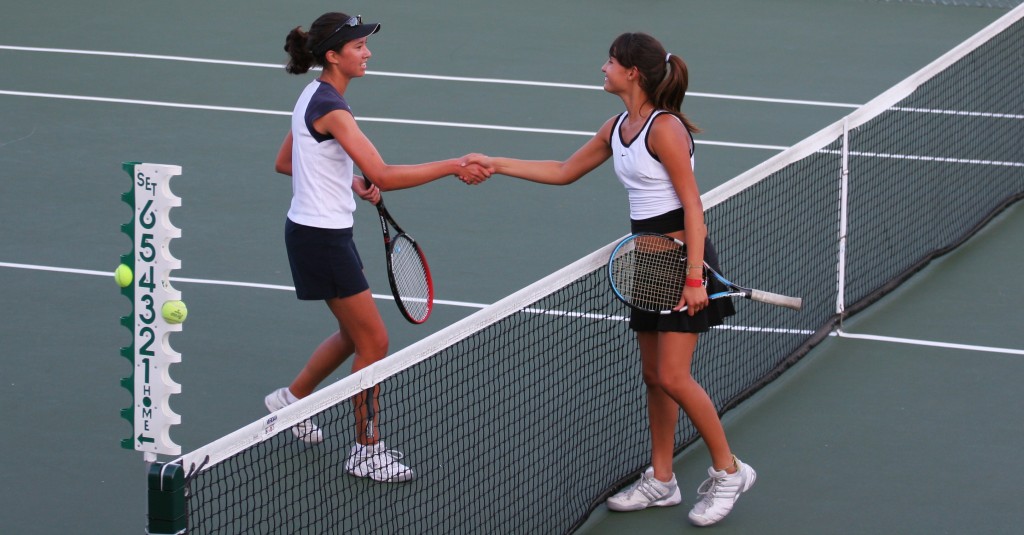 It’s tough enough trying to look like you know what you’re doing on a tennis court when you’re just learning the strokes and strategy. The last thing you want to do is embarrass yourself by interfering with players on other courts or irritating your opponents.
It’s tough enough trying to look like you know what you’re doing on a tennis court when you’re just learning the strokes and strategy. The last thing you want to do is embarrass yourself by interfering with players on other courts or irritating your opponents.
Understanding some of the basics of tennis etiquette will help you fit in with your friends, teammates and others at the club or park and help you look like you know what you’re doing.
Call the Score
If you’re serving, make sure to call the score before every point. This not only lets your opponent know you’re ready to serve, but also prevents score disputes later.
Respect the Neighbors
Don’t roll balls behind or onto someone else’s court during a point. If a ball comes onto your court from another match, wait until they have finished their point to return their ball or roll it back to the fence in-between your two courts (but not behind their court where they could potentially trip and fall). Even if you roll the ball out of harm’s way during a point, at least one side will see that ball rolling behind the court and might become distracted, stopping the point (which will have to be played over).
If your ball goes onto or behind another court, don’t retrieve it if the players are playing a point. If a ball rolls behind a player or players who don’t see it and they might injure themselves by stepping on it, you might need to warn them. However, this can cause them to stop playing a point they might have won, getting you a lecture. In these situations, you are often damned if you do and damned if you don’t. Don’t worry, you’ll eventually learn to get the hang of when to issue give a warning and when to keep quiet.
Fair Warmups
Before a match, players have five minutes or so to warm up. This is not practice time. You should hit balls in a way that lets your opponent warm up, and they should do the same for you. When your opponent comes to the net, for example, don’t blast balls past her or right at her. Make sure she can practice her volley.
Don’t Play Out Serves
If your opponent hits an obviously out serve, don’t hit it back. Hit it into the net or let it roll into the fence behind you. Practicing your return makes your opponent wait to hit his second serve and may require him to clear the ball.
Question Only Once
If you think (or even know) your opponent has made a bad call, you can ask once (per point) for clarification and that’s it. No matter how flagrant a bad call, you can’t argue. If there’s an official, you can ask for a referee to make calls, but it’s impolite to keep challenging the same call — and, you might be wrong!
Let Kids Play
Parents should not coach kids, make calls, explain rules or give coaching advice during junior matches. The only exception to this is if the league rules encourage this (often for beginner tournaments) and parents are unbiased, helping both or all four children. Getting involved with your child’s match also puts pressure on her and makes it less fun.


Thank you for sending out this information. Over the years I have been playing it has become apparent players are getting less and less information or are getting careless on the most basic etiquette rules. Another tip I would like to add is when opponents are giving balls back to the serving team, they should not throw/send balls back while backs are turned around. I hate having to retrieve balls that are haphazardly thrown back when no one is watching. Thank you.
Renata, thanks for the addition. I agree!
So glad I’m not the only one who dislikes when those balls are whizzing by with my back turned – it s dangerous!
Yeah, I’ve had an opponent smack the balls as hard as he could at me in mixed-double warm up. He practically took my head off, twice, when I was at the net warming up. I kindly asked him if he could lessen his strokes, and he said he couldn’t. As a result I congratulated him on winning the warm-up. He gave his secret away, so when the match was over we won because my partner was able to volley most of his shots for put-always. 🙂
Another bit of tennis etiquette that I was taught 100 years ago is to pick up the balls on your end of the court before changing ends. So many people don’t do this. That’s just what you should do.
I was taught that the non-receiving tennis partner should make service calls for the service line and the outside line but not the line down the middle. The receiver should make this call. The reason for this is because the non-receiving partner is on the outside of the line and really can’t tell if the ball catches the line or not. Where the receiving player is on the inside of the line and is able to tell if the ball catches the line. It is very frustration when my partner serves an ace and the non-receiver call the serve out. Please tell me where I can find this etiquette rule in print.
A service obviously out I don’t have a problem with.
Two basic rules of etiquette infractions I am now seeing: 1. Spectators who cross a court during a game between points! Really? Are you kidding me?! Please include that you cross a court between games and more preferably between sets. Never during a game! 2. Spectators who walk out of a court or into a court and don’t close the gate after them! How to show you are rude and clueless… walk out of a court and leave the gate open!